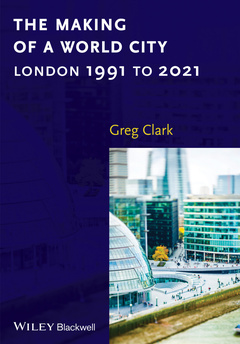The Making of a World City London 1991 to 2021
Auteur : Clark Greg

After two decades of evolution and transformation, London had become one of the most open and cosmopolitan cities in the world. The success of the 2012 Olympics set a high water-mark in the visible success of the city, while its influence and soft power increased in the global systems of trade, capital, culture, knowledge, and communications.
The Making of a World City: London 1991 - 2021 sets out in clear detail both the catalysts that have enabled London to succeed and also the qualities and underlying values that are at play: London's openness and self-confidence, its inventiveness, influence, and its entrepreneurial zeal. London?s organic, unplanned, incremental character, without a ruling design code or guiding master plan, proves to be more flexible than any planned city can be.
Cities are high on national and regional agendas as we all try to understand the impact of global urbanisation and the re-urbanisation of the developed world. If we can explain London's successes and her remaining challenges, we can unlock a better understanding of how cities succeed.
About the Author ix
Foreword by Martin Simmons xi
Preface by Rosemary Feenan and Robert Gordon Clark xiii
Acknowledgements xv
Section I London in 1991 – Setting the scene
1 Introduction: Honor Chapman and London:World City 3
2 London prior to 1991: The back story 11
Planning for a new world city 12
The rise of finance and a new rationale for post-industrial London 13
A hiatus of government 16
The LDDC and a new era of pragmatism 16
3 The 1991 London:World City report and its message about London 19
Old rivals, new rivals 22
An agenda for metropolitan governance 24
Brand new: The promotion of London 26
The future knowledge economy 29
Section II The evolution of London, 1991 to 2015
4 The internationalisation of London’s economy 35
Internationalisation of London’s labour force 39
The global financial crisis and after 43
5 Leadership, governance and policy 47
1997 and a new direction for metropolitan government 52
The London Plan: A global city strategy 56
London boroughs 59
Promoting London 60
London’s governance today 66
6 Re-investment and urban regeneration 69
Cultural revitalisation of the South Bank: Lambeth, Southwark and Greenwich 72
New regeneration powers from 2000 74
Regeneration in perspective 77
From de-industrial to post-industrial: Building a new experience for markets, leisure and commerce 80
7 Corporate hub, officemarket and real estate 87
The rise and rise of tall buildings 88
The diffusion of London’s office geography 89
The transformative impact of foreign capital 93
8 Homes and housing in London 99
Consensus but complacency in the 1990s 100
The London Plan and a new agenda for housing 101
London’s housing predicament: Prospects and solutions 107
9 London’s evolving infrastructure platform 111
The impact of TfL and citywide government on transport 113
From incrementalism to integration? 117
Section III London today and in the future
10 World cities today 121
Measuring world cities in 2015 125
Emerging world cities 128
Insights from benchmarks about short- and long-term city success 132
11 London in the next decade: Implications of the rise of other world cities 135
Finance and business: Global leadership in a new context 138
Culture, diversity and destination 143
Higher education, technology and new sectors 145
Sustainability and liveability: Aspiration or reality? 149
Infrastructure, housing and skills 151
12 Investment in London: Challenges and solutions 159
London’s relationship with the UK 160
London’s constrained investment scene 162
The financial and investment capacity of London’s five principal rivals 166
London’s fiscal position in perspective 169
13 Eight imperatives for London 175
14 Lessons from London for other cities 187
Appendix 195
Bibliography 197
Index 219
Greg Clark is a Londoner and expert on world cities. He works as an advisor to OECD, World Bank, Brookings Institution, ULI and more than 20 major cities around the world (including Auckland, Barcelona, Brisbane, Cape Town, Hong Kong, Johannesburg, Moscow, New York, Oslo, Rio de Janeiro, São Paulo, Singapore, Sydney and Toronto) but learned what he knows from working in London as a leader in city agencies during the period covered by this book. He has written four books for the OECD and several published reports for the Brookings Institution, British Council and ULI.
Date de parution : 12-2014
Ouvrage de 248 p.
17x24.4 cm



